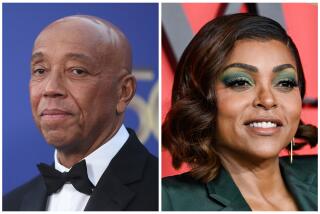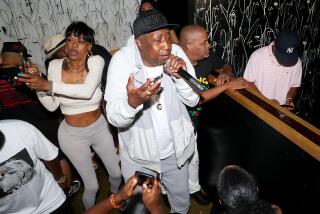Sharpton to hit street to clean up rap
- Share via
The Rev. Al Sharpton will lead a protest today in New York in an effort to pressure major music companies into banning three pejorative words, including the one that forced shock jock Don Imus off the airwaves.
Supporting the campaign to clean up rap lyrics is hip-hop pioneer and mogul Russell Simmons, who co-founded Def Jam Recordings and founded Russell Simmons Music Group.
Sharpton added that he had become more motivated to have such language banned because James Brown, whom he once managed, on his deathbed had urged the activist to “be more aggressive in cleaning up the music.”
Sharpton and Simmons’ recent stance contrasts sharply with their positions in the 1990s, when they were outspoken advocates of free expression in rap lyrics.
Sharpton told reporters in 1995 that record label executives should not “cave in” to calls from the right wing to censor lyrics because doing so would “infringe on our 1st amendment rights.”
The effort comes in the wake of Imus’ firing from MSNBC and his CBS radio job after he used the phrase “nappy-headed hos” in a reference to the Rutgers University women’s basketball team.
In an interview Wednesday, Sharpton said he was specifically urging recording labels to ban the words “bitch,” “nigger” and “ho,” which appear frequently in rap music.
On April 23, Simmons and Benjamin Chavis, president and chief executive of the Hip-Hop Summit Action Network, recommended “that the recording and broadcast industries voluntarily remove/bleep/delete the misogynistic words.”
They also emphasized that their discussions were not about censorship but respecting African Americans and other minorities.
In a 1992 Los Angeles Times op-ed piece, Simmons wrote that “oppression of artistic expression, like any sort of oppression, should not be tolerated.”
But in the interview Wednesday, Sharpton drew a distinction between his past and current views.
“This is not censorship -- this is a call for responsibility,” he said. Sharpton noted that labels already prevent artists from using homophobic and anti-Semitic lyrics and said they should do the same with racist terms.
Simmons could not be reached for comment.
It’s not surprising that Simmons and Sharpton are changing their tune, said Todd Boyd, professor of critical studies at USC and the author of “The New H.N.I.C: The Death of Civil Rights and the Reign of Hip Hop.”
Sharpton needs visibility and is creating a target to make himself relevant, and Simmons is trying to evolve from a hip-hop mogul to a more spiritual kind of leader, Boyd said. But Simmons is unlikely to stop certain lyrics because he has lost some of his relevance with younger artists, he said.
The reversal by Simmons and other industry leaders also may be a response to the genre’s declining sales, said Tim Leffel, co-author of “Hip-Hop, Inc.: Success Strategies of the Rap Moguls.”
*
More to Read
The biggest entertainment stories
Get our big stories about Hollywood, film, television, music, arts, culture and more right in your inbox as soon as they publish.
You may occasionally receive promotional content from the Los Angeles Times.











